Assam Floods: Over 56 lakh people affected in 30 districts; death toll mounts to 109 – DNA, AUG 2, 2020
China floods: 100,000 evacuated as waters reach Giant Buddha statue – The Guardian, AUG 20, 2020
Death toll rises to 36 and at least 1,607 hospitalized in Turkey earthquake – CNN, JAN 26, 2020
Sample of news headlines from climate-related disasters which occurred in 2020. As we reported in our Reflections 2020 article, the financial impact of natural disasters in 2020 caused due to weather changes amounted to $150bn.
When climate disaster occurs, we usually speak about deaths, financial losses, and property damages to assess the impact of climate events. While it helps in drawing eyeballs and attract attention but is that the only consequence of climate change.
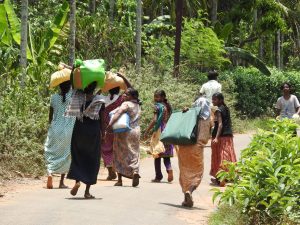

The impact on the lives & livelihood of people affected by a disaster can persist for years after a climate event or a health-related emergency. Moreover, the sufferings are far greater for the marginalized communities than many others – health problems & injuries, food shortages, disaster-related diseases, lack of job opportunities, increase in debt burden, gender violence, loss of children education, mental health problems – the list can go on.
Apart from the health aspects, the COVID pandemic gave us some serious instances of the hardships faced by the marginalized communities. Kenya reported an increase in cases of domestic and sexual violence against women and children. As per a UNICEF report, more than 450 million children across the world were unable to access remote learning after COVID closed many schools.
What is the solution? A hope that we do not have any climate or health disasters.
While that dream is too far-fetched, hence recognizing the problem and being better prepared is a much better alternative. Including the marginalized communities within the purview of disaster and climate change-related policy is foremost. Secondly, empowering the marginalized communities to be adequately equipped in case of a disaster event and ensure that they have the resources available to make their recovery faster.
The first solution essentially falls under the realm of the policymakers, but the second option can be addressed by any of us. That’s where Humane Warriors comes in, a group of young warriors is trying to create a positive impact on the lives of people who suffer the most.
Founded by
The warrior team of donors, community members, and most importantly the wholehearted team of volunteers have brought smiles to more than 200,000 people.
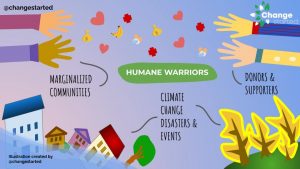

Humane Warriors also provided a helping hand during the Assam flood relief when millions of people in the northeastern part of India were ravaged by devastating floods in July 2020.
With a passionate team, the Mumbai-based organization is trying to build resilient communities by empowering them with the right set of tools and knowledge. Humane Warrior is also doing research on the causes of climate change hazards, disaster management, and disaster mitigation.
After graduating from IIT Bombay, many would have settled for a plush corporate job but not Rhythmia.
Rhythima Shinde has taken her love for mountains & nature to a new level, currently pursuing her Ph.D. in environmental analytics but already has a couple of startups to her name – Energy Bazaar which is about peer-to-peer energy trading and Humane Warrior.
Here is an edited version/excerpts of our conversation with Rhythima Shinde, where she gives interesting insights on climate diaster management, the thought process behind Humane Warriors, her environmental journey, and the plans for the company. For the full discussion please watch the video.
From IIT degree to getting into Environment, tell us about your journey?
While pursuing my mechanical engineering from IIT Bombay, I used to go out and could see things happening in society. Life outside campus was very different from things at college – things like poverty, electricity shortages, etc. I could feel the bubble in which we were living, which was extremely privileged versus the world which was outside.
I started thinking of utilizing my education from this prestigious university to build something better for the outside world. I started to participate in social entrepreneurship and leverage my projects to do something better for the world and close this inequity to some extent.
Then I applied for a master’s in engineering and policy analysis, which was relatively unknown on the campus. During the placement times, there was a couple of offers for corporate jobs at FMCG, but I decided not to join, as I wanted to learn more and become part of the developmental sector.
I came to the Netherlands to pursue my master’s, and here I got interested in the Energy and sustainability sector. I could see that if I have to make an impact at a global level, I have to learn more about sustainability and everything around it.
What were the trigger points?
It started at IIT, I came to know about corporate social responsibility (CSR) and from that, an idea came to my mind. At IIT, all of us are tech geeks but I realized that it is important that we should be socially responsible as well, that started Tech geek social responsibility (or TechGSR).
The concept was that if the young students who are working on technology products come together and implement their solutions to address problems in rural areas.
I worked with students from CTARA, a rural technology lab from IIT Bombay. We used to visit a small tribal community nearby to understand their problems like energy, water & sanitation, electrification, etc.
That’s when I realized that I have to work in the sustainability & development sector, which is an interdisciplinary field. For that, I need to learn specific skills like stakeholder management, financial management.
Then in the Netherlands, I joined the Energy club as a Board member, this is a student body, to create awareness of the renewable energy sector.
Can you explain environmental analytics, which is your Ph.D. subject?
When I was working on the peer-to-peer energy exchange system I realized energy in itself is a very small subject in sustaiabilty and the environment sector. I wanted to understand more about sustainability in its entirety.
We have data available from energy grids, consumer markets, different usage points – can we leverage this data to see trends & patterns to understand the problems and fit them into solutions. I wanted to use the analytics for environment and sustainability sector.
That’s when I applied for a Ph.D. at ETH Zürich, and currently pursuing that from Switzerland. Here I am not just working on the energy but on the housing market. As cities and the population are increasing, it is creating a burden on the energy demands. To integrate energy with the energy demands of cities, we need sustainable cities. Through my Ph.D. project, I am trying to see patterns in energy consumption and creating solutions for the building sector, which create lesser carbon footprints.
Hence, environmental analytics combine fields of data science, policy analysis, and environmental engineering tools specifically for sustainable buildings and cities.
Tell us about Humane Warriors?
In March 2020, when we came to know about the lockdown in India and that migrant laborers were suffering due to a lack of food.
Then I and one of my friend Naveen decided to do something about it. Within 2 days we launched a crowdfunding campaign to raise funds in Europe and send it back to local partners & NGOs in India.
The snowballing effect was so big that we were able to reach 450 donors and collected about 41,000 francs (Rs 3.2 million) in a month. With that money, we were able to reach 30 local organizations across India and provided help.
Looking at the impact, we decided that we are not going to stop here. As part of the process, we created a small group of volunteers & developed partnerships with NGOs.
We registered this as a nonprofit organization, which is called Humane Warriors. The company has 4 pillars under it.
- Zero Hunger movement
- Quality Education
- Reduce inequalities and women empowerment
- Climate Action and Climate Change
All these are closely related to each other, like climate action and social action cannot work independently. It will be the marginalized community that will be affected the most in the case of climate disasters.
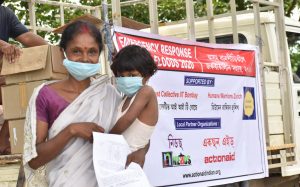

In Climate action we worked during the Assam floods by supporting the people with flood relief kits along with an organization called IIT Bombay for Justice. We are going to pursue a project with them on the causes of the recurring floods, rehabilitation, disaster relief, and steps that can be taken for disaster mitigation.
We have worked on the EIA petition which again impacts the marginalized community.
Humane Warriors is a very young organization with about 40 people and still trying to figure out where we fit the best, but climate action is going to be our biggest pillar.
We focus on the economic losses of the Climate event but overlook the social angle, what are your thoughts
Unfortunately, events like calamities, uncertainties, pandemics will get bigger & bigger over the years. Therefore our goal is to build resilient communities that can bounce back after the calamity.
- The first project happened during the Assam floods, Humane Warriors provided people with health & hygiene kits. Many times people get food but they start having problems like diseases, for which they do not have sufficient healthcare facilities. That’s why we do not contribute to the food side, but on the health & hygiene side. In an event like a flood if a disease gets to one person like say Malaria it can easily spread to the community. Hence when we talk about climate action we have to keep the social equity side as well.
We do not want to stop here and hence we are pursuing more research to be better prepared for future events.
- The second project which I can talk about is Energy Bazaar, which is about peer to peer electrification market. This means that if I have a solar panel on my rooftop, I can trade electricity with other connected households. It increases energy accessibility and availability in rural areas, which enables communities to grow.
We have successfully developed, tested, and integrated the platform with new technologies like AI and blockchain. Through this, we want to build self-sustainable communities where they have access to solar power on a continuous basis.
What is your process and structure of operations?
None of these projects can work without partnerships, vendors are lending the technology, then there is an engaged community that trusts you, and finally the team of volunteers.
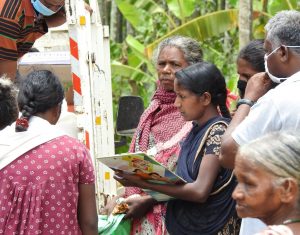

To build trust we have regular communication with communities, involve them in various aspects of the projects and give them ownership. In our case, 90% of the projects are owned by the community.
All our projects at Humane Warriors are only possible because of the amazing volunteers who are sitting in Europe and the US. The volunteers are mainly students and young professionals.
For the Indian volunteers, though physically disconnected from their home they are working for the love of their country.
There are also volunteers from Switzerland and Spain who are helping us with these projects. We leverage the skills of every individual and then they work into specific projects accordingly.
What are the future plans?
At a personal level, I will always work in the sustainability sector and might get into consulting space where I can solve problems on sustainability.
At Energy Bazaar, that is a two-year timeline where we want to implement the solution and make it is a full-fledged project.
Humane Warrior, will be a platform where we empower more social change makers, who can come up with any project within the 4 pillars (Zero Hunger movement, Quality Education, Reduce inequalities & women empowerment, Climate Action, and Climate Change)
The main vision will continue to be about combating the social & environmental inequity and supporting the marginalized communities. It could be through technology, monetary support, or by raising awareness.
How do you manage the monetary part?
Humane Warriors started with crowdfunding as we have diaspora in many countries and we tap into that.
We are also looking for investments, we are treating Energy Bazaar as a startup and would look for venture capital.
What was the idea behind the name Humane Warriors?
This came after the design thinking workshop where we realized that we represent the team & community. People who are working with us, there are donors and then there are people who are working every day on the ground for the community.
All of us are fighting for a better world and we mean it in a good way. We thought about the warrior spirit which means to never give up, no matter what the situation is. This is something which we see in all these people.
Then we are all very humane, hence the name Humane Warrior.
What is your personal connection with nature?
Yesterday I was on a hike at Mount Titlis. I love hiking and being with nature. At least once in 2 weeks I will go for a hike or run, as it gives me perspective about everything in life.
You can watch the full conversation here. Let us hope that Rhythima and the team of Humane Warriors scale many more mountains.

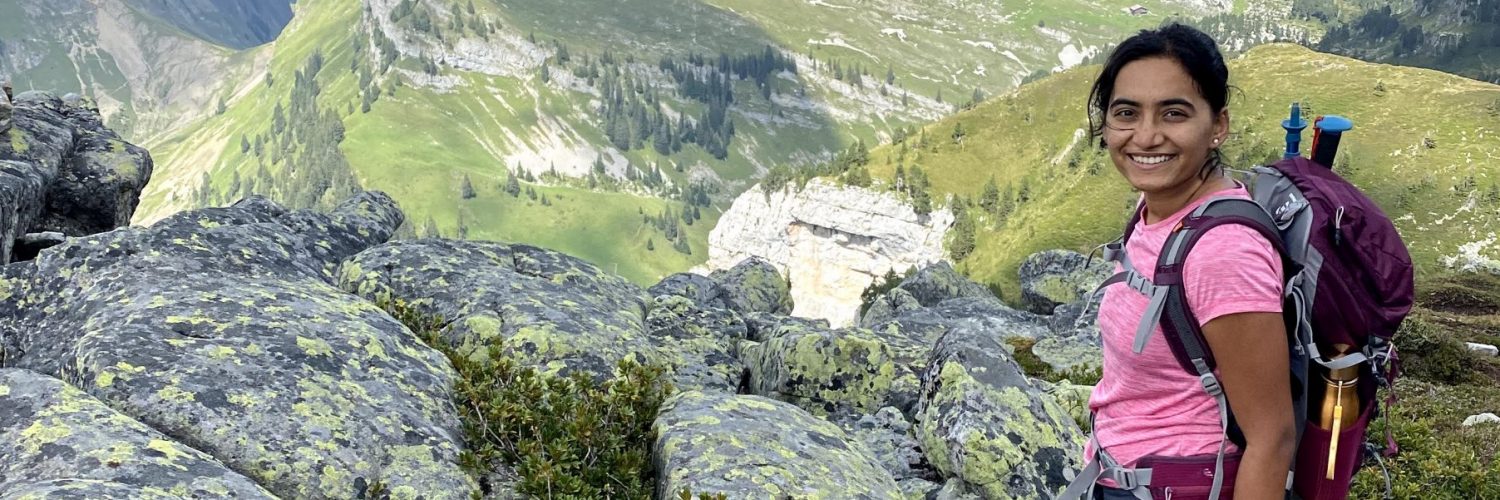
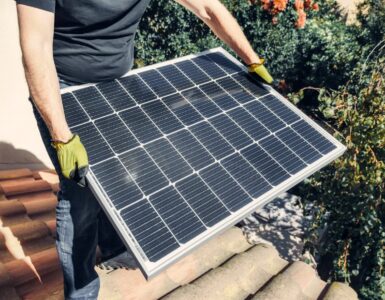
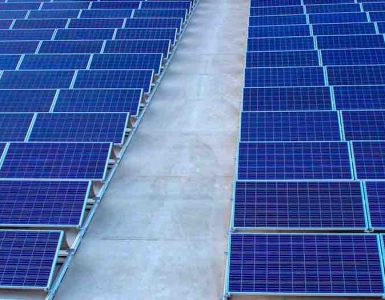
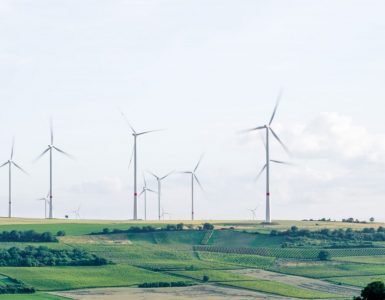
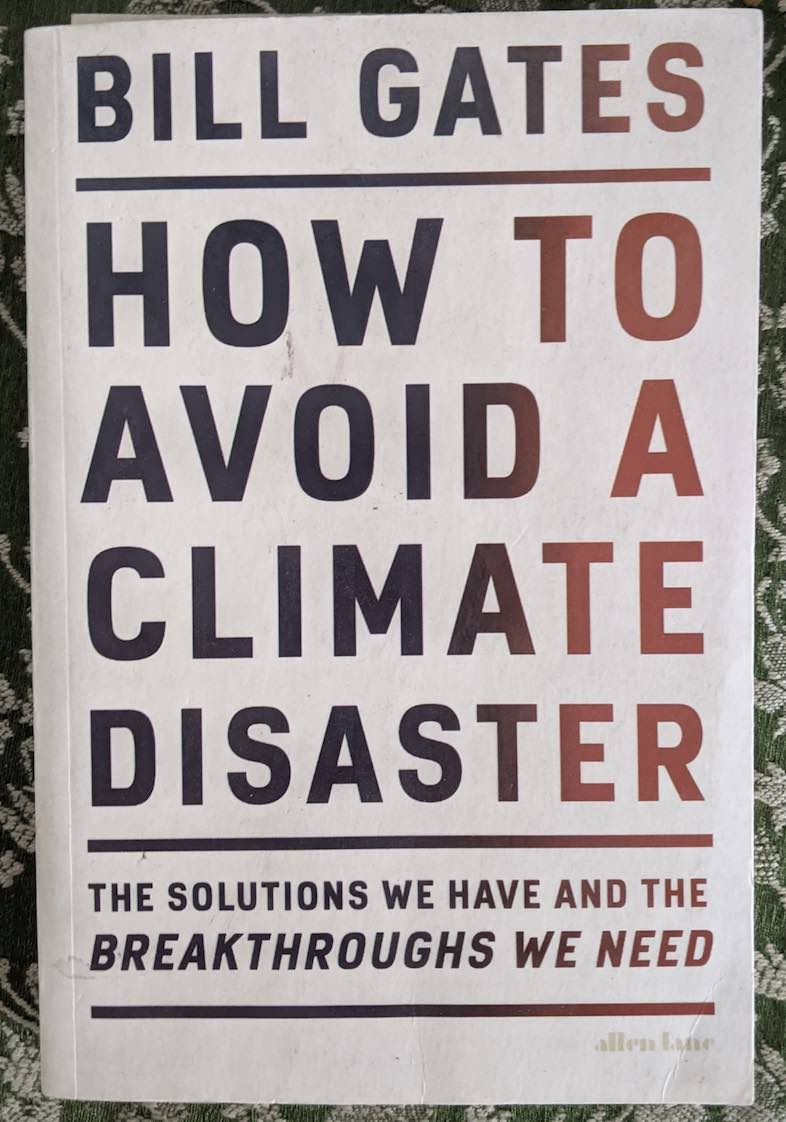

Add comment